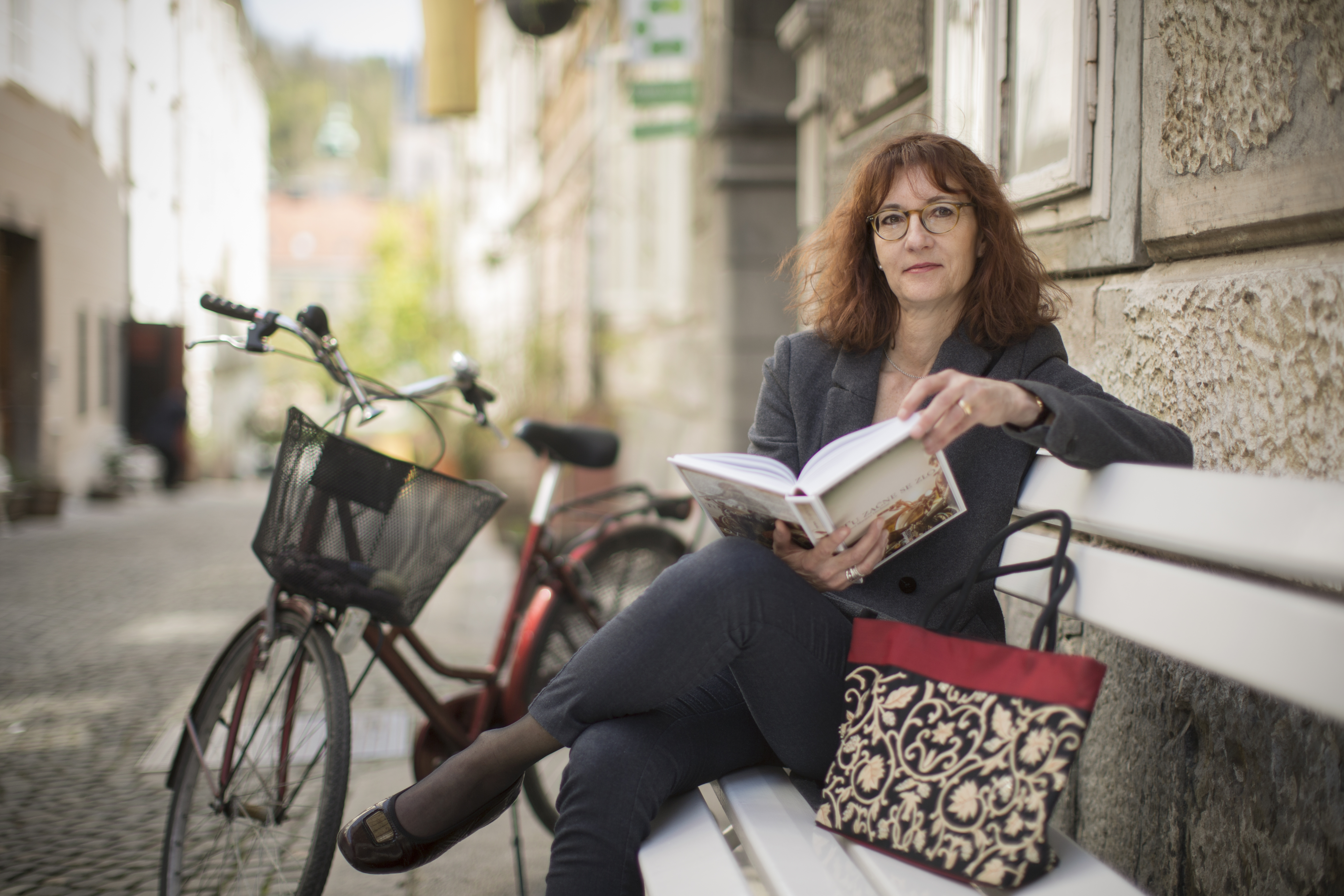
Born in 1967, Veronika Simoniti began her career as an author of children’s books, first publishing her work on Radio Slovenia. Her first story collection, Zasukane Štorije (Twisted Stories) received Slovenia’s Best First Book of the Year in 2005. In 2011, she published her second collection, Hudičev jezik (The Devil’s Tongue) and in 2014, her first novel, Kameno seme (The Stone Seed) which was shortlisted for the Kresnik Prize 2015 for the best Slovenian novel. In 2019, Cankarjeva založba published her second novel Ivana pred morjem (Ivana in front of the sea), which was nominated for the Modra ptica Prize for best manuscript (2017), for the Kritiško Sito Prize of the Slovene Literary Critics’ Asssociation (2020) and won the Kresnik Prize 2020 for the best Slovenian novel. In the same year, a collection of short stories Fugato was published (Litera) and nominated in 2020 for the Novo Mesto Prize.
For her story “Sixty Percent,” she received the Women’s Council of Trieste Prize in 2013. Her work has appeared in numerous international anthologies and has been translated into fifteen languages.
WIKIPEDIA in English: Veronika Simoniti
ENGLISH EDITIONS
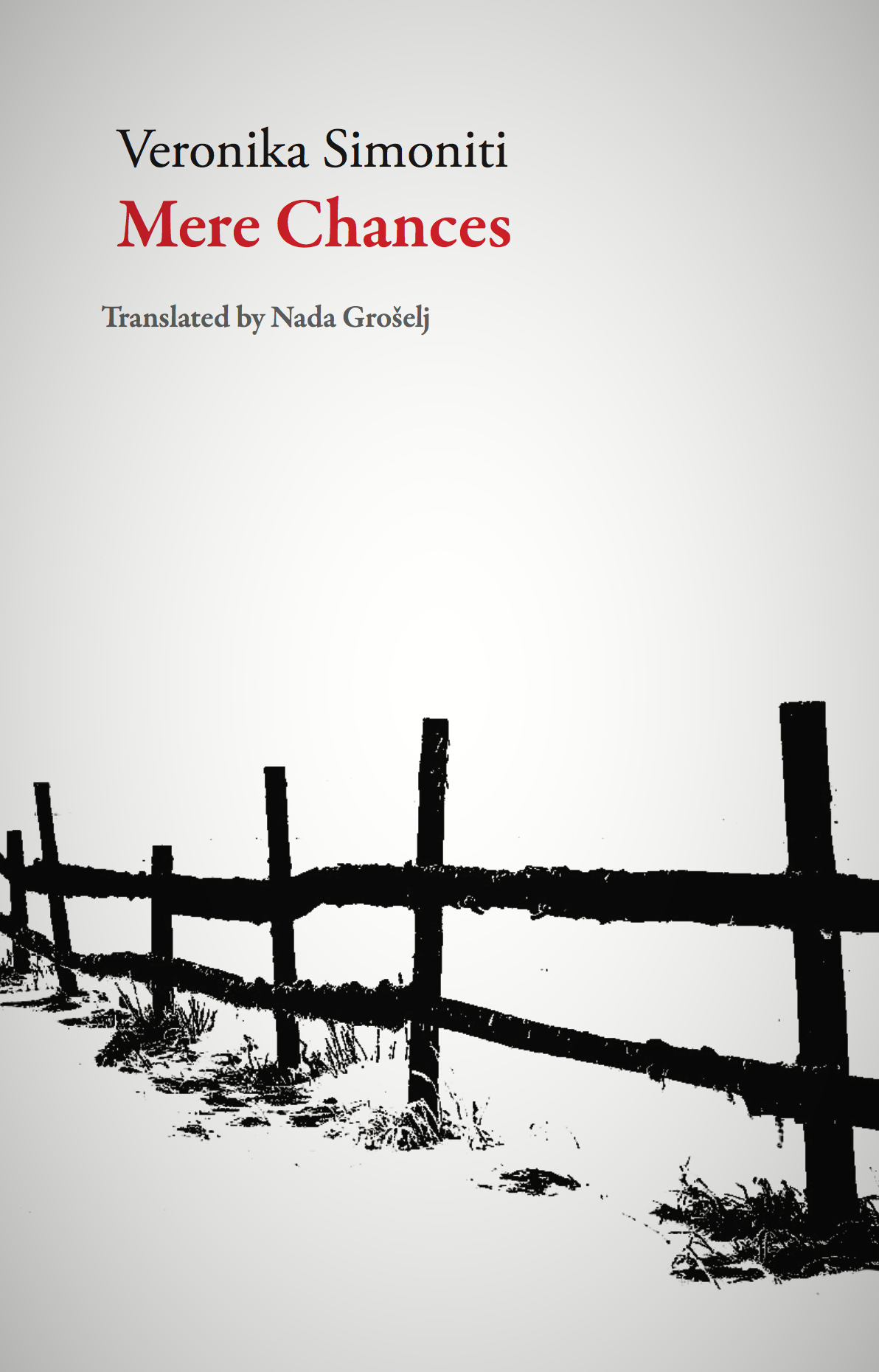
Mere Chances collects some of Veronika Simoniti?s most singular and strange stories. A linguistic experimentalist in the tradition of Julio Cortazar, Simoniti populates her tales with homeless and nomadic characters struggling to fashion or to maintain their identities as they cross physical and linguistic borders. Whether compelled to communicate in codes not their own or grappling with the loss of language itself, her characters’ struggles to forge stable identities point to the way human language, while fundamental to the formation of the self, is often an unreliable and imperfect tool.
In Veronika Simoniti’s “On the Mainland,” the narrator goes to spread his late wife’s ashes. He starts with Provence as a destination, then settles on Tuscany—it’s closer. He crosses the border from Slovenia into Italy, the ashes in an urn “firmly wedged among the other stuff” on the front seat. But along the road, he passes an ocean liner biding its time in a slim canal. Rethinking the ashes’ destination, he takes the urn aboard and falls asleep, only to be awakened by a workman who invites the mourner to his home for coffee. When the man returns to his car, his wife’s ashes are gone.
Simoniti’s stories in this collection explore those moments when place slips beyond one’s imagination and into the limb; moments, often in the corners of a strange city, when one looks for a semblance of what’s real. In his great essay, “Mapping Home,” Aleksandar Hemon calls this a need for a “personal infrastructure” against the impact of dislocation. At points, one has to present the facade of a self in a world of dissolving borders and unknown place. When things resonate with “uncanniness or distance,” Simoniti’s tales similarly offer a new way into the uncertain and unbound geographies here.
Things have weight in the stories of Mere Chances—languages, walks along train platforms, and especially loss. Hearing the “homey clatter of plates” in an Italian city, a young Slovenian woman reflects, “This is exile.” Lifted out of Europe and set down by her family in Bolivia, a schoolgirl observes the weight that “the old world” still has on her grandmother’s memory. Her grandmother continues to live in that old world, ignoring the Bolivia that surrounds her; the granddaughter calls her grandmother’s adaptation “forgetting from the back.” Dislocation forces other adaptations in Simoniti’s stories. Do even the dead remember “other worlds?” Refiguring his identity, a man recalls his father’s development of a noiseless typewriter, not-so-noiselessly concluding: “I was not my father’s masterpiece.”
One thing that is lost in these stories is a coherent, bounded Europe. Simoniti’s characters move through unmapped and imagined Europes. They travel in a range of weighty glances, erased borders, and accidental substance. One attempts to sell the Eiffel Tower for scrap metal. Another, propelled by a terminal cancer diagnosis, heads for Portugal, “to peer through the cracks of Southern Europe’s most reclusive people.” These characters’ essential skill is an ability to “dissemble,” a capability to present all the marks of some identity that is expected, a semblance of a known or anticipated world even as that world is in the process of disintegrating. According to the narrator of “Portugal,” “This isn’t running away . . . it’s just something I need to do before I run away for real.”
The narrator in “On the Mainland” surmises, “It doesn’t matter where exactly you transform into new substances . . . abroad is a place that’s different.” He recrosses old boundaries, loaded with the weight of “losing” his partner twice, having “mislaid [her] for good.” He returns to his corner of Europe, his task on that odd (and very real) line between finished and incomplete. His conclusion, in Nada Grošelj’s wonderful translation: “Let me know, by the way, if there are any such words as home and abroad on the other side.” — Garin Cycholl, http://www.raintaxi.com/mere-chances/
Mere Chances is a collection of short stories by Slovenian author Veronika Simoniti that consists of an eclectic array of characters. With crowded dialogue and rich descriptions, she paints a complex picture of her characters’ identities and explores the nuances of Slovenian culture. World Literature Today
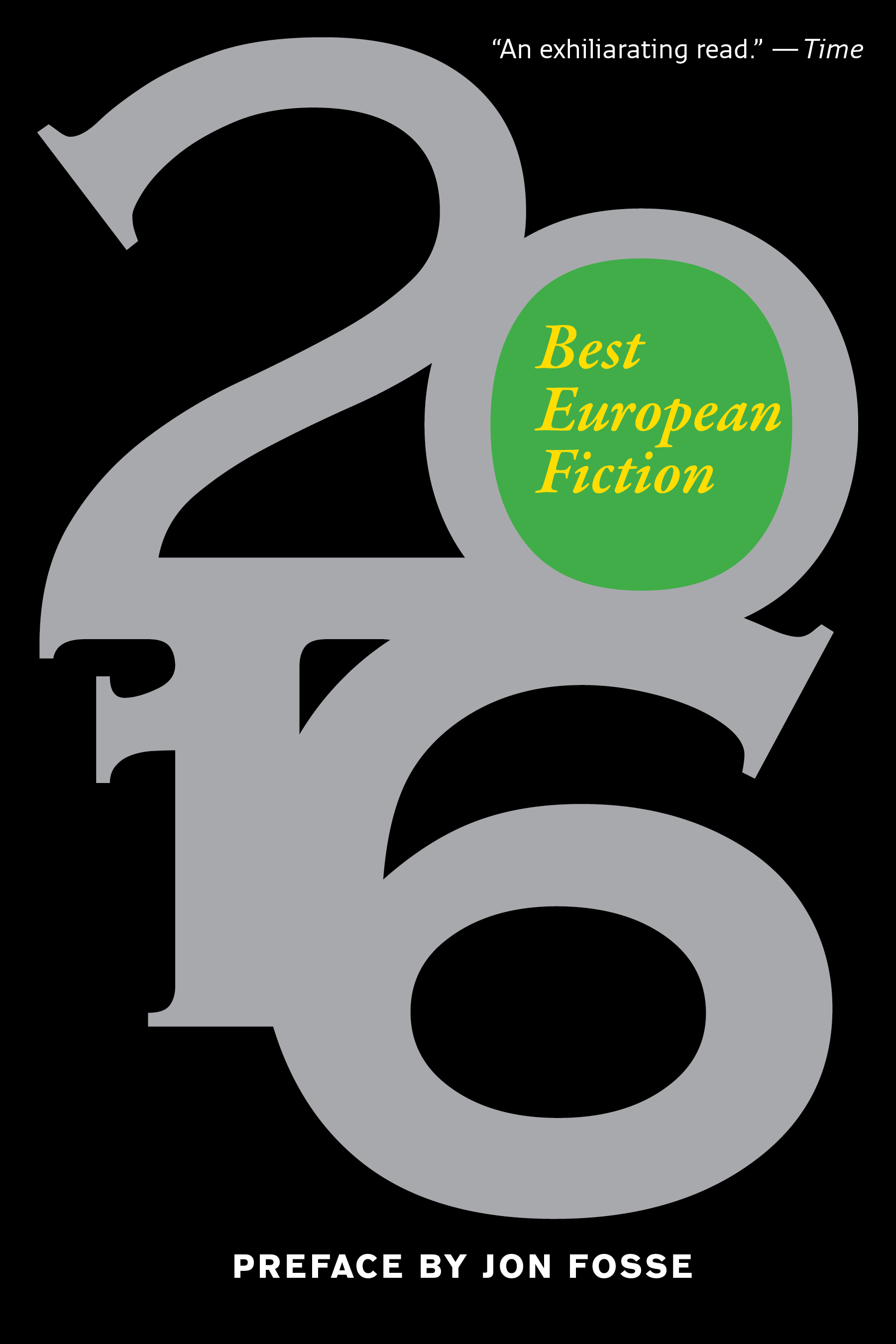
ANTHOLOGIES
“Returning closer to home, the anthology Best European Fiction 2016 combines 29 different writers from across the continent, here translated into English. Concerned largely with politics or literature, the standout story is Veronika Simoniti’s pertinent A House of Paper, in which a translator is convinced her body is shrinking as some sort of penance for her lifetime of ‘counterfeiting […] in another language.’” —Ruth Gilligan, The Irish Independent
The Stone Seed, excerpt, pp. 16, 17. Translated by Špela Bibič. V: 10 Books from Slovenia, Center za slovensko književnost/Center for Slovenian Literature, 2015.

“The True Story of Victor Lustig” is the American debut of Slovenian author, Veronika Simoniti, whose short stories have won numerous awards (…) – Storyville App. 2013.
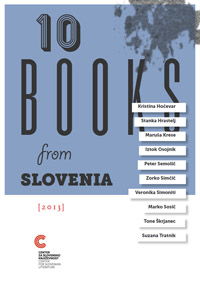
The True Story of Victor Lustig, excerpt, pp. 14, 15. Translated by Špela Bibič. V: 10 Books from Slovenia, Center za slovensko književnost/Center for Slovenian Literature, 2013.
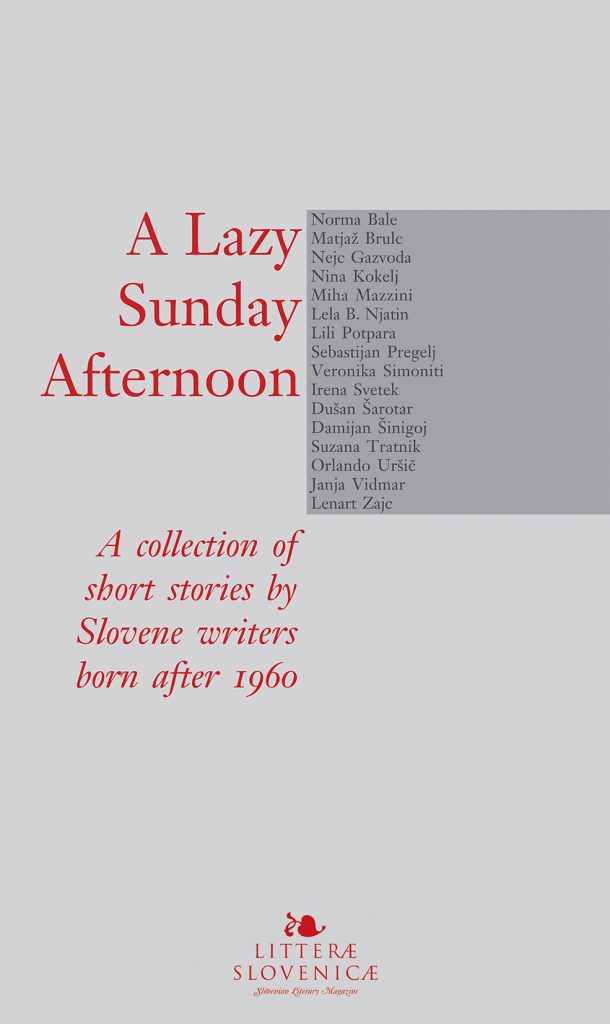
Aegeus. Translated by David Limon. A Lazy Sunday Afternoon. A collection of short stories by Slovene writers born after 1960. Litterae Slovenicae, Slovenian Literary Magazine, 3/2007/XLV/112, pp. 59 – 63.
https://litteraeslovenicae.si/wp-content/uploads/vzorec_a-lazy-sunday.pdf
Portugal. Translated by Erica Johnson Debeljak. Ten Authors from Slovenia (Petra Pogorevc). Ljubljana 2006, pp. 3.1 – 3.4.
It’s already the Morning of the Last Day, Sandorf Passage 2023
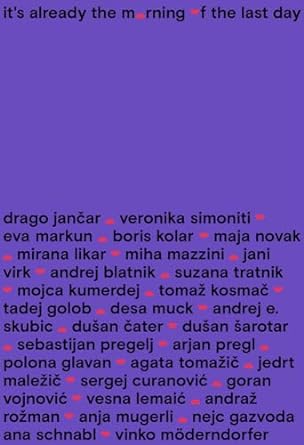
PRESENTATIONS & BLURBS
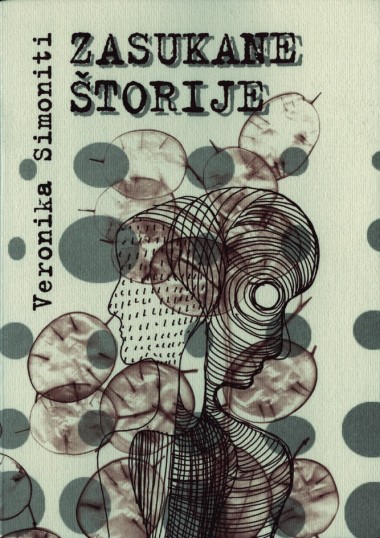
“Zasukane Štorije (Twisted Stories) – There are twenty stories in the collection that are characterized by the concept of twistedness. The stories have a short, open, anecdotal structure that contains unexpected jumps, twists and resolutions. Internal tension emerges from the deliberate construction of the narrative, the economic presentation of key moments, and the intentionally spare drawing of the characters. These stories are submerged in a contemporary world that is never exactly what we fi rst think it is, as it constantly refl ects and refracts art, history and myth. The protagonists are idiosyncratic urban characters who are defi ned as much by concrete events and everyday reality as they are by desire, nostalgia, and longing. We recognize these characters from our own travels and movements in space and time. The experiential worlds are fragile and fl uid and resonate on many levels. The author’s style is specific and unique, incorporating the innovative use of archaic expressions, challenging narrative hooks, and tactical oscillations between different narrative levels. The author links all of these elements into an enviably effortless narrative style making Simoniti’s debut collection one of the most promising first books of the year.” – Petra Pogorevc, Ten Authors from Slovenia, p. 3. I (Translated by Erica Johnson Debeljak), 2006.
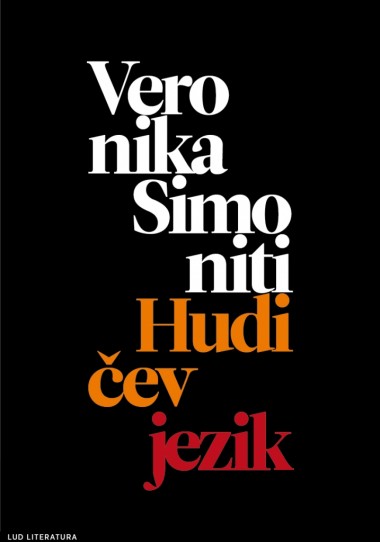
“The Devil’s Tongue carries the call and the spirit of faraway worlds, its setting is the whole world. Not only its surface, not only the different places in all time periods, including the times past, equal representation to this so-called reality is also given to literary worlds, history and the personalities broken and burdened under its weight, to artists of all orientations, styles, their diverse and at times paradoxical fates. Cortázar’s opening quote therefore not only functions as a kind of tribute to the master, but also announces the main topic of the collection: the problem of language as an unreliable tool that cannot capture reality, but creates its own, new and equally unreliable, slippery. Right beside it are the problems of identity, related to the loss of this same language, no longer taken for granted. The stories are thus full of people who have found themselves on a mixed language territory, languageless, displaced in different and adopted languages, never quite their own, at other times deprived of a single syntax as a result of their injuries.” – Matej Bogataj, from the text on the book jacket (Translated by Nada Grošelj), 2011.
“The Devil’s Tongue is an impressive fusion of the concrete and the abstract, an intellectual type of prose that deals with the complex issues of language and identity, but does so through a sensual, visually powerful, even carnal image. We are often somewhere at sea, in the sun, surrounded by lush vegetation, in fantasy worlds with magical and fantastic elements (…).” – Iva Kosmos, Dnevnik (Daily), 2012. Translated by Nada Grošelj.
“Tautological as this may seem, the stories from The Devil’s Tongue are first and foremost stories about language, its multiplicity of meaning, its contradictions. The author’s cosmopolitan protagonists, celebrated artists and scientists among them, do not merely create fictive identities and realities but are themselves elusive, multiple existences. […] The stories feature some summer and plenty of the sea, which functions as the most consistent metaphor of language and at the same time as its opposite, enduring even when language, individual or common, has disappeared.” – Tanja Petrič for RTV Slovenija, the broadcast “Kaj bereš?” (“What Are You Reading?”), 2012. Translated by Nada Grošelj.
“The second collection by Veronika Simoniti, a well-known translator, is a harmoniously orchestrated array of stylistically polished, atmospheric and lyrical short narratives, which playfully address a wide range of issues.” – Mojca Pišek for the broadsheet Dnevnik (Daily), 2012. Translated by Nada Grošelj.
“The abundance of her writing is inspired by Mediterranean exuberance, but without complete or uncritical identification with the latter: another dichotomy that proves highly creative. Indeed, this is her means of establishing a fresh and unique mood: spontaneity as perceived by a delicate, reserved personality, a blend of tenderness and passion, of the sensual and intellectual, the picturesque and the ironic. Most importantly, she reintroduces into contemporary sensibility a receptiveness to all things large, transcending, faraway, beyond reach.” – Lucija Stepančič for Sodobnost (Contemporaneity), a literary magazine, 2012. Translated by Nada Grošelj.
“It is amazing what possibilities are offered by something as self-evident and everyday as language.” – Kristina Jurkovič for Radio Ars, the broadcast “S knjižnega trga” (“From the Book Market”), 2013. Translated by Nada Grošelj.
Simoniti’s protagonists in Teufelssprache (“The Devil’s Tongue”) are often “multi-settlers,” people from multinational environments (e.g. from Trieste or Istria), uprooted, alienated from self and surrounding – often “victims” of the violent maelstroms of history. It is for this reason that Veronica Simoniti’s fiction is a harrowing, nostalgic kaleidoscope of the war-stamped twentieth century. Her stories are not diffuse and fragmentary, but full-blooded and complex, sometimes enchantingly magical. Above all, however, they are disturbing narratives about what happens when people are transplanted from one language to another; they are about people on the border and about all those individuals who shift these borders, for example, in art (like Joseph Brodsky, Italo Calvino, Guillaume Apollinaire, Ivan Cankar, Max Brod, Carlo Michelstaedter, Silvina Ocampo or Alejandra Pizarnik). But the narrator’s central dilemma remains: If the borders of one’s language are the limits of one’s word, where are the limits of language as such? How far can we actually go? – From: Presentation of “Teufelssprache” at Boook Days in Potrna
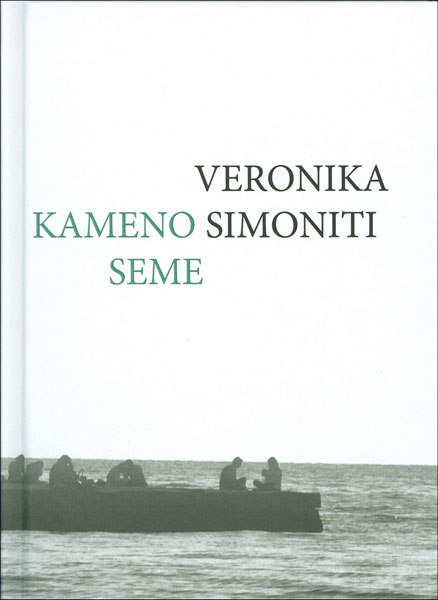
The novel The Stone Seed (2014, Litera, Maribor; 225 p.) follows the stories of several people, locals and foreign tourists, whose paths cross in an imaginary summer resort on some Croatian island. If they weren’t before, their fates now become intertwined: one evening an angry local named Mira, scarred with pain three times over – as an adopted child who never knew her real mother, as an orphan whose foster parents disappeared during the nineties’ war and as the partner of a traumatized war veteran – throws a stone from her garden at a group of tourists having a pool party. The stone hits a Paraguayan tourist in the eye and sets off a chain of events: the Paraguayan, who now has to wear an eye patch and strains his other eye to see, his vision still blurry, tells his wife’s conservative family about his brother-in-law’s “sin” that he claims he dimly saw from afar. The two events weave the lives of all the protagonists into an unexpected mosaic that also reveals their fatal actions in the past.
Central to the plot are four sets of characters: Mira and her boyfriend Marko, the Cosolini family (father Claudio and mother Tristane, their daughter Nina, their little granddaughter Paloma and son Gino) which the Paraguayan João married into, an Italian couple (Francesco and Francesca) and a Croatian family (the barkeeper Željko, his wife Letizia and their daughter Kate) who run a local bar. All the chapters are written in the third person but the perspective is that of the protagonist in question, allowing for several possible interpretations of what has actually happened. Did João really see his brother-in-law Gino fooling around with Francesco? Did Gino’s father Claudio suddenly disappear from the shame of having learned about this or, like the Greek tyrant Polycrates, to give up a small bit of his happiness in an effort to please the gods? Is Kate really Claudio’s daughter? Fifteen years after that turbulent summer, the now grown-up Paloma tries to uncover the truth with the help of the chief of police who got suspended for shooting at Marko.
The setting in which the throw of a stone triggers the unexpected chain reaction is idyllic, which is more than one could say for the lives of the protagonists, each of whom has brought their own problems or traumas to the island. The novel thus not only reflects on the elusiveness of truth but above all looks at the concept of truth in relation to happiness and its (non)existence. – (Translated by Špela Bibič)
“Rarely has a central metaphor been chosen with such care while being open to so many different and multi-layered interpretations. The stone seed referred to in the title is primarily the stone that someone throws at João that, in turn, triggers a chain of events which uncover the secrets of a small community of locals and holidaymakers in the holiday village Anti in Croatia. The people in this community can also be said to live lives set in stone, stuck in the bygone days, either because of relationships that some of them stay in even if the spark is long gone or was nothing more than an illusion to begin with, or because of their bourgeois conservativism on which their whole identity rests. Last but not least, the stone can be seen as a kind of metaphor of the novel’s wonderful mosaic-like structure – a single story illuminated from the subjective perspectives of protagonists whose different understandings, different views and beliefs, even cultural and national backgrounds, slowly piece together the big picture before the reader’s eyes. The novel therefore contains elements of a psychological, family, detective or crime novel, of a love and coming-of-age novel. The Stone Seed’s greatest strength is its detailed insight into the minds of individual literary characters (…) Some of the chapters would probably work as independent short stories or novellas, which also speaks to the book’s perfection and the reading pleasure it brings.” – From the review The Stone that Started the Avalanche by Aljoša Harlamov, Delo, 2015.
Slovenian Book Agency’s Translation Tip for Foreign Publishers: Ivana before the sea by Veronika Simoniti
A beautiful novel about family secrets and three generations of Slovenian women during the turbulent 20th century. A masterpiece on 173 pages.
Veronika Simoniti (1967) began her career as an author of children’s books, first publishing her work on Radio Slovenia. Her first story collection, Zasukane Štorije (Twisted Stories) received Slovenia’s Best First Book of the Year award in 2005. In 2011 she published her second collection, Hudičev jezik (The Devil’s Tongue) and in 2014, her first novel, Kameno seme (The Stone Seed) which was shortlisted for the Kresnik Prize 2015 for the best Slovenian novel of the year. This year Cankarjeva založba published her second novel Ivana pred morjem (Ivana before the sea) and the critics love it.
In the novel the narrator returns from Paris, where she has created a home for herself, to the Primorje region in Slovenia in order to clear the apartment that belonged to her late mother for a serious buyer, and in a heap of yellowed photographs she finds a picture of her grandmother, holding her five-year-old mother’s hand, whilst her other hand lies on her pregnant belly. The year it was taken, 1943, was one of troubling events and rapid change. What happened to the unborn child? Through a number of parallel stories taking place at different times and generations of one family, Veronika Simoniti’s novel presents the reader with the collective past and individual fates. A beautiful novel about unpleasant times and things.
You can read a review from the web edition of the Slovenian national television here.
The novel is 173 pages long and an English sample translation is available.
For more info, please contact Mrs. Senja Požar, senior rights manager at Mladinska knjiga and Cankarjeva založba publishing houses: senja.pozar@mkz.si.
Veronika Simoniti wins Kresnik Prize for novel Ivana Before the Sea
The Slovenia Times, CULTURE, 24 Jun 2020 / By STA
Veronika Simoniti has won the 30th Kresnik Prize for best novel of the year for Ivana Before the Sea (Ivana pred Morjem). She thus became only the fourth woman to win the prestigious award, given out by publisher Delo. The novel tells multiple parallel stories happening in different periods to different generations in one family.
“The harsh evil which one can sometimes not escape reads smoothly in Veronika Simoniti’s carefully selected language…,” the five-strong jury said.
“The storyteller’s grandmother Ivana realises what kind of a mirror a calm lake can be to people, she feels the love rush of a river and longs for the Adriatic. She goes towards the sea, but never reaches it. As the title suggests, she always remains before it,” the jury also said.
The novel was inspired by the old-fashioned character of a photo and the smell of an old sofa, said Simoniti, adding she had played with memory and forgetfulness.
She said as part of Tuesday’s awards ceremony atop Rožnik hill in Ljubljana that for her, “memory is something without which we don’t exist, it’s our identity”.
Simoniti, 52, was shortlisted for the Kresnik once before, in 2015, for Kameno Seme (The Seed of Stone). This year’s winning novel was published by Cankarjeva Založba.
The writer has joined another three women novelists who have received the Kresink since it was launched in 1990: last year’s laureate Bronja Žakelj, Katarina Marinčič (2002) and late Berta Bojetu (1996).
Looking back at the award’s 30 years, its “father”, author Vlado Žabot said he was happy that the idea and the award had survived for three decades.
“They have served as an effective encouragement and promotion of Slovenian literary and spiritual creativity in the form of novel. We definitely need this.”
To mark the anniversary, Delo also gave out the Kresnik for best Kersnik-awarded novel between 2010 and 2019, which went to Drago Jančar’s To Noč Sem Jo Videl (I Saw Her That Night; 2010). Jančar is also the only author to have won four Kresniks, this one being the fifth.
Also in the running for the prize together with Simoniti were Sebastijan Pregelj with V Elvisovi Sobi (In Elvis’s Room), Suzana Tratnik with Norhavs na Vrhu Hriba (Madhouse on a Hilltop), Branko Cestnik with Sonce Petovione (The Sun of Poetovium) and Jirži Kočica with Izvirnik (Original).
In Elvis’s Room, a story about a generation growing up in the 1980s and 1990s as Yugoslavia was slowly disintegrating, won the Cankar Prize, a newly-introduced literary award, two days ago.
Veronika Simoniti wins Kresnik Prize for novel Ivana Before the Sea
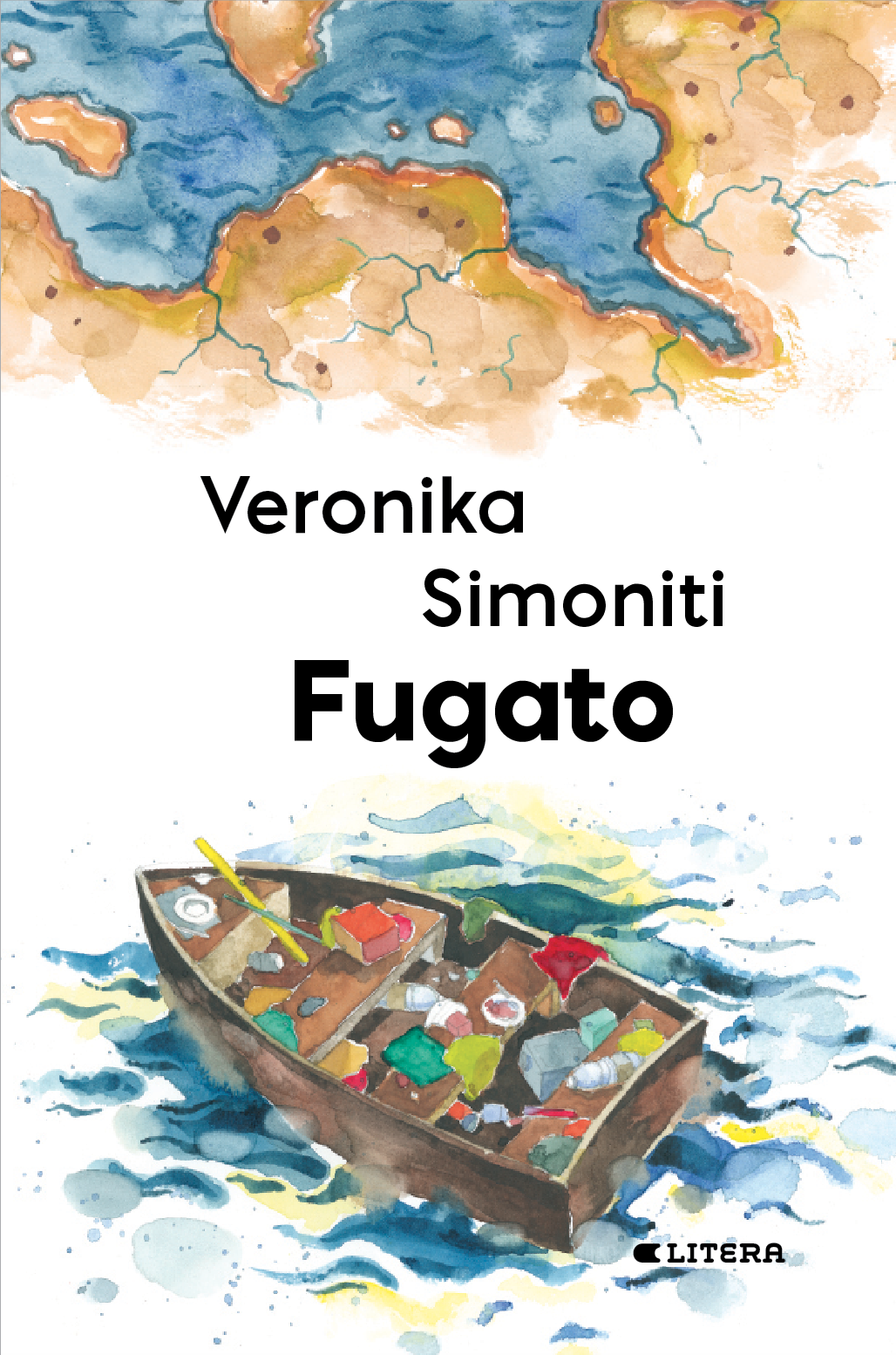
From a Rewiev by Tanja Petrič in Versopolis:
“The collection is a bundle of stories underscored by unexpected twists, craftily exploiting the Rashomon shifting of standpoints and “truths”. In Veronika Simoniti’s prose, the latter is always multidimensional and ineffable (“this is a true story, and truth can never be told”, whispers the mother to the dead son in the introductory story). The truth is imbued with individual and collective memories, fancies, yearnings, imagination, mythology and reflection.” (…) “Fugato is undoubtedly Veronika Simoniti’s most emotional and compassionate collection of short stories so far, which are also unified in terms of formal composition. Despite the deeply moving fates ending in death, Simoniti, with full responsibility and deeply rooted in humanism, ensures that the surviving protagonists cultivate and foster the Kovič hope that the “Southern island exists”. “
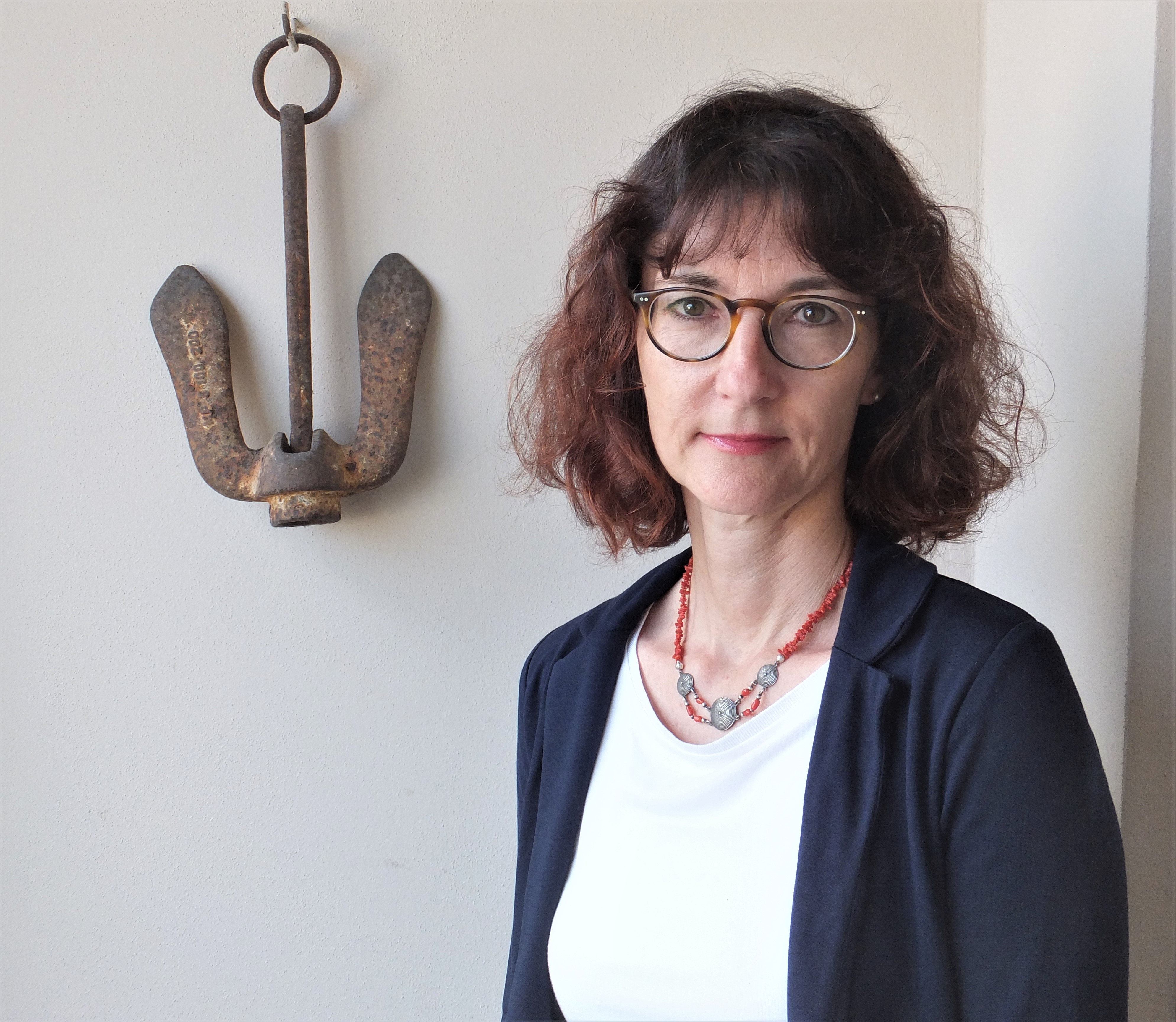
“Stories contain so many possible twists and turns, but only one twist and turn really interests me: why, out of all the thousands of twists and turns, precisely this twist, precisely this turn. Let’s say you tell me what your three favourite things are and I tell you why I think – though I have known you all of two weeks – it is so. Each thing has a hidden story behind it.”
(Garda Stories. Translated by Erica Johnson Debeljak)
VIDEO
– Veronika Simoniti, Author. Javna agencija za knjigo, 20. oktober 2022, Youtube.—
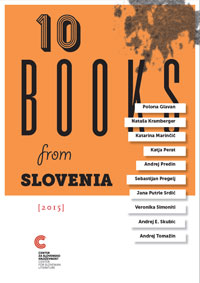

Devi effettuare l'accesso per postare un commento.